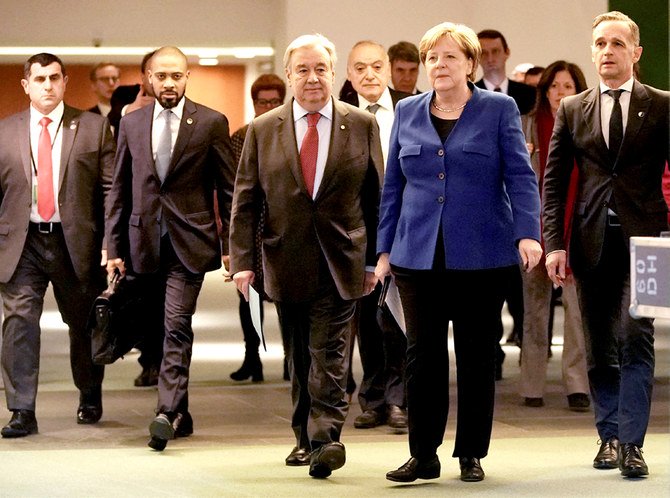
- ARAB NEWS
- 27 Apr 2024

Arab News
JEDDAH: With the conclusion of the Libya peace summit in Berlin on Sunday, it remains to be seen whether Turkey is willing to implement the provisions of the final communique and stay out of the conflict.
Ankara is accused of sending Syrian fighters to the Libyan battlefront in support of Fayez Al-Sarraj’s Tripoli-based Government of National Accord (GNA) against military commander Khalifa Haftar’s forces.
During the summit, French President Emmanuel Macron voiced concerns over the arrival of Syrian and other foreign fighters in Tripoli, saying: “That must end.”
Samuel Ramani, a geopolitical analyst at Oxford University, speculates that Turkey will not deploy more troops.
But he told Arab News that a sudden end to Ankara’s intervention in the Libyan conflict is unlikely for the moment as Turkish President Recep Tayyip Erdogan said his country will remain present “until the GNA’s future is secured.”
Noting the difficulty of enforcing the Berlin agreement, Ramani said Turkey might not be the first mover in breaching a cease-fire in Libya.
But he added that Turkey will not hesitate to deploy forces and upend the agreement if Haftar makes any moves that it considers “provocative.”
The summit called for sanctions on those who violate the UN Security Council arms embargo on Libya.
Turkish opposition MPs recently criticized the expanded security pact between Ankara and the GNA, saying the dispatch of materials and equipment to Libya breaches the UN arms embargo.
The summit does not seem to have resolved ongoing disputes regarding the Eastern Mediterranean pipeline, a planned natural gas pipeline connecting eastern Mediterranean energy resources to mainland Greece via Cyprus and Crete.
The Cypriot presidency accused Turkey of being a “pirate state,” citing Ankara’s recent drilling off its coasts just a day after Brussels warned Turkey that its plans were illegal.
Erdogan dismissed the warning and threatened to send to the EU some 4 million refugees that Turkey is hosting.
Turkey dispatched its Yavuz drillship to the south of Cyprus on Sunday, based on claims deriving from the maritime delimitation agreement with the GNA.
Turkey’s insistence on gas exploration in the region may be subject to sanctions as early as this week, when EU foreign ministers meet in Brussels on Monday.
Aydin Sezer, an Ankara-based political analyst, drew attention to Article 25 of the Berlin final communique, which underlined the “Libyan Political Agreement as a viable framework for the political solution in Libya,” and called for the “establishment of a functioning presidency council and the formation of a single, unified, inclusive and effective Libyan government approved by the House of Representatives.”
Sezer told Arab News: “Getting approval from Libya’s Haftar-allied House of Representatives would be a serious challenge for Ankara because Haftar recently considered all agreements with Turkey as a betrayal. This peace conference once more showed that Turkey should keep away from Libya.”
Many experts remain skeptical about the possible outcome of the summit.
Micha’el Tanchum, a senior fellow at the Austrian Institute for European and Security Policy, said: “Until we see what specific cease-fire monitoring and enforcement mechanisms will be implemented and by which foreign powers, we don’t know what arrangements, if any, have been agreed upon.”